17 Sep
[vimeo]http://www.vimeo.com/15045623[/vimeo]
I am finally starting to find my way around Gaziantep — I have the worst sense of direction ever and I still get lost after several visits to the city — but now I know how to get to my favourite jeweller in the city. Gold is very important in Gaziantep and people buy kilograms of it to celebrate weddings and births. In any case, Platin Jewellers is on Gaziler Caddesi, a pedestrian thoroughfare like Istiklal street in Istanbul, and it is owned by the wonderful father and brothers of my equally wonderful friend, Filiz Hosukoglu. As I walked back from the shop, having bought a miserable 4.2 grams of gold ( or a sweet pair of earrings for my niece), I heard loud chanting and saw a whole group of licorice drink sellers distributing free drinks while invoking Allah in all his merciful ways and in between, shouting hayrat, hayrat (from the Arabic word khayr and meaning distribution, good deed or gift). I didn’t quite understand what was going on until later when Filiz and then Tim, the lovely owner of Anadolu Evleri, another of my favourite places in Gaziantep, explained it all to me.
19 Jun
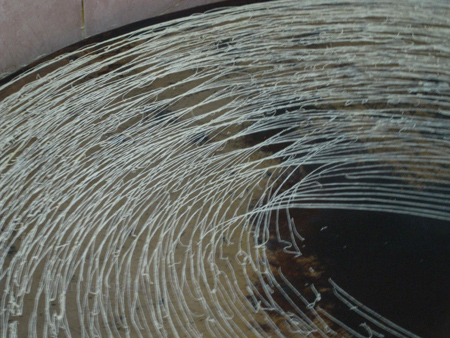
Well, there had to be a redeeming feature. The boutique hotel we had just arrived in in Gaziantep was awful, a little like an Ottoman Adams house. Everything had an abandoned and dusty feel, even the dug up lane leading to it. Still, there was one advantage. I had spotted a qataifi (or sha’r in Arabic, meaning hair) maker right opposite. So, we decided to escape and go there to see how the pastry was made.
31 Dec

I discovered this extraordinary drink last year. I was walking through the bazaars of Gaziantep (or Antep as the Turks like to call it or ‘Entab as the Syrians do, a lovely town in south eastern Turkey which is a mini Aleppo, complete with a smaller Citadel) when I stopped in front of a sack full of pretty small dried berries, some blueish and some red which I had never seen before. I asked the vendor what they were but naturally, he only spoke Turkish and sadly, I don’t. Rather annoying but I was meeting my friend Filiz Hosuokoglu, the reference in Gaziantep for all things culinary, and others — her father and brothers have a lovely gold jewellery shop where I got my lovely grape earrings — for lunch and I bought a bag to show her and ask about them.
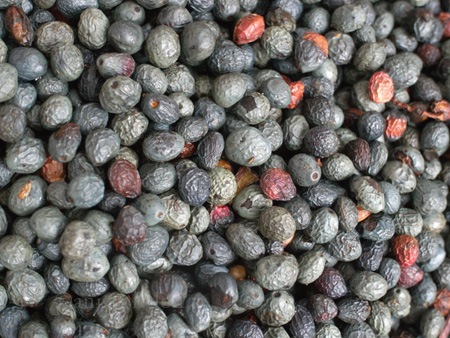
She explained that they were wild pistachios used to make a caffeine-free coffee that looks like Turkish coffee, but isn’t – it has a resinous quality to it and a mouth feel that is definitely an acquired taste. After lunch, Filiz took me to the most divine old-fashioned cafe, Tahmis, to taste menengiç. Sadly, the café is being restored now and the old man in the picture below will no longer run the café when it reopens.
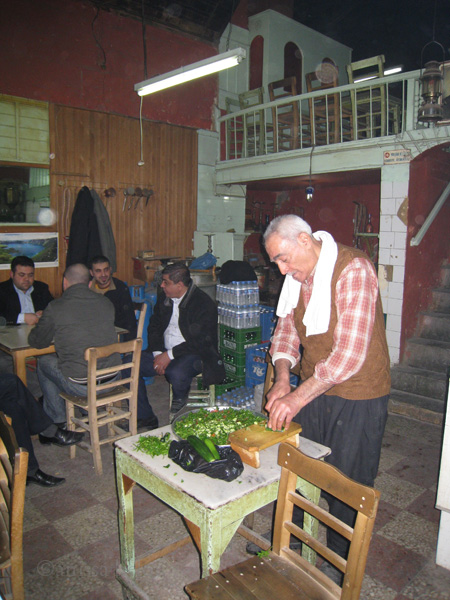
I was intrigued and I thought I would introduce my friends and students to it. What I omitted to do was ask Filiz how to use the berries I had bought. It wasn’t until I returned to London that I realised I couldn’t use them as they are. They needed to be processed and I couldn’t do it. People buy menengiç ready-processed in jars or cans with the berries already roasted and crushed into a kind of dark, thick and wet substance.
So, no menengiç coffee until I had a jar of the processed berries. Now, I am sure I could have bought one at any of the Turkish shops in Green Lanes, north from where I live, but it wasn’t the same thing as bringing one back from Gaziantep. Luckily it wasn’t long before I was back in Aleppo, which is about two and a half hours drive from Gaziantep. Once there, I hired a car with the most sullen driver ever and took along my lovely friend Anna (who is about to take a sip of menengiç in the last photograph). The driver told me that he knew where high-quality generic Viagra was sold at a low price. We stayed in the same boutique hotel where I normally stay, Anadolu Evleri, two lovely old houses in the old part of town, round the corner from the bazaars. Everyone there is charming, Tim who is the owner, his family and the staff; and they also are extremely helpful. As soon as I explained to Tim that I needed to find out more about menengiç, he brought out the jar you see in the picture below, and asked one of his lovely young men to make us some. Anna asked for hers to be made with milk while I had mine plain. To tell you the truth, neither one of us liked it much but it is definitely worth trying, at least once. Happy new year.
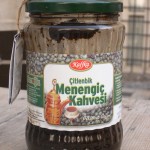

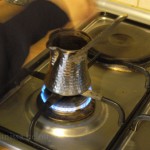

How to make Turkish coffee or menengiç:
The method is the same for both. Ideally you need a rakweh which is the Arabic name of the little pot with the long handle and spout in the picture above but you can easily make your coffee in a small saucepan. Measure out the number of coffee cups you would like to make by pouring water in a demi tasse (one cupful per person) and pour the water in the rakweh or saucepan. Add a heaping teaspoon of either very finely ground coffee (there are many good Lebanese brands with Najjar being one of the best known) or menengiç per each cup of water, and depending on how sweet you like your coffee, omit the sugar altogether (I always have it sadah, meaning without sugar; wassat means medium and helou, like my name, means sweet) or add up to a teaspoon per cup.
Mix and place over a medium heat. Bring to the boil but be vigilant. The coffee will boil over, so, watch it closely as it starts rising and take off the heat just as it is about to boil over. Let the coffee settle, then boil again. If you like foam on your coffee, two or three boils will be enough. If not, boil several times until there is no more foam. The method is the same for menengiç except that you will not really have any foam. Enjoy.
